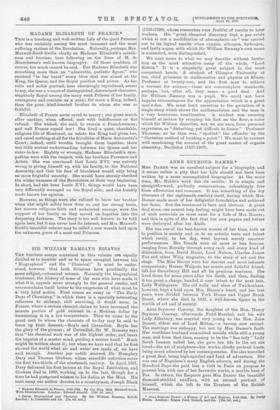MADAME ELIZABETH OF FRANCE.* Tins is a touching and well-written
Life of the good Princess who was certainly among the most innocent and the most suffering victims of the Revolution. Naturally, perhaps, Mrs.
• Maxwell-Scott dwells chiefly on Madame Elizabeth's saintli- ness and heroism, here following on the lines of M, de Beauchesne's well-known biography. Of these qualities, of
• course, too much cannot be said. But Madame Elizabeth was something more than an "admirable, pathetic figure," who received "in her heart" every blow that was aimed at the King, the Queen, and the Royal position and power. As her calm and noble portrait, here charmingly reproduced, seems to say, she was a woman of distinguished, determined character, singularly Royal among the many weak Princes of her family, courageous and resolute as a man; far more a King, indeed, than the poor, kind-hearted brother to whom she was so faithful.
Elizabeth of France never cared to marry; one great match after another, when offered, met with indifference or flat refusal. She wished, she said, to remain a Frenchwoman; and well France repaid her She lived a quiet, charitable, religious life at Montreuil, an estate the King had given her, and cared nothing at all for the frivolities of Marie Antoinette's Court; indeed, until trouble brought them together, there was little mutual understanding between the Queen and her sister-in-law. Rightly or wrongly, Madame Elizabeth's sym- pathies were with the emigres, with her brothers Provence and Artois. She was convinced that Louis XVI. was entirely wrong in giving himself up, with his family, to the National Assembly, and that his fear of bloodshed would only bring on more frightful anarchy. She would have sternly checked the wilder excesses of the Revolution at their very beginning. In short, had she been Louis XVI., things would have been very differently managed on the Royal side; and she frankly made known her opinion.
However, as things were, she refused to leave her brother when She might safely have done so, and her strong brain, her sincere religious faith and undaunted courage, were the support of her family as they moved on together into the deepening darkness. The story is too well known to be told again here, but it can never lose its interest, and Mrs. Maxwell- Scott's beautiful volume may be called a new wreath laid upon the unknown grave of u most real Princess.






















































 Previous page
Previous page